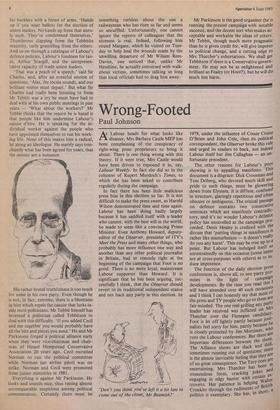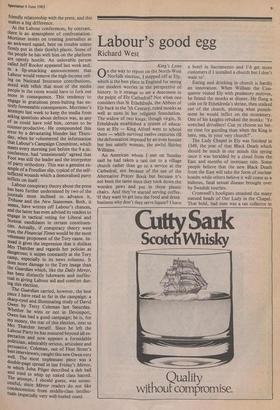Wrong-Footed
Paul Johnson
ALabour heads for what looks like disaster, Mrs Barbara Castle MEP has been complaining of the conspiracy of right-wing press proprietors to bring it about. There is one thing wrong with this theory. If it were true, Mrs Castle would have been driven to expound it in, say, Labour Weekly. In fact she did so in the columns of Rupert Murdoch's Times, to which she has been asked to contribute regularly during the campaign.
In fact there has been little malicious press bias in this election so far. It is not difficult to make the press sweet, as Harold Wilson demonstrated time and time again. Labour has been doing badly largely because it has saddled itself with a leader who cannot, with the best will in the world, be made to seem like a convincing Prime Minister. Even Anthony Howard, deputy- editor of the Observer, presenter of ITV's Meet the Press and many other things, who probably has more influence one way and another than any other political journalist in Britain, had to concede right at the beginning of the campaign that Foot is no good. There is no more loyal, mainstream Labour supporter than Howard. It is significant that he has been arguing, suc- cessfully I think, that the Observer should revert to its traditional independent stance and not back any party in this election. In
'Don't you think you've left it a bit late to come out of the closet, Mr Beamish?'
1979, under the influence of Conor Cruise O'Brien and John Cole, then its political correspondent, the Observer broke this rule and 'urged its readers to back, not indeed Labour itself but Jim Callaghan — an un- fortunate precedent.
The other reasons for Labour's poor showing is its appalling manifesto. This document is a disgrace: Dick Crossman and Tom Driberg, who devoted much skill and pride to such things, must be glowering down from Elysium. It is diffuse, confused in structure, glaringly repetitious and often obscure or ambiguous. The critical passage on defence contains two consecutive sentences which are manifestly contradic- tory, and it's no wonder Labour's defence policy has unravelled as the campaign Pro- ceeded. Denis Healey is credited with the dictum that 'putting things in manifestos is rather like masturbation — it doesn't really do you any harm'. This may be true up to a point. But Labour has indulged itself so unrestrainedly on this occasion (some items are at cross-purposes with others) as to in- duce impotence. The function of the daily election press conferences is, above all, to test party pro- mises in the light of campaign developments. By the time you read this I will have attended over 40 such occasions and I think I can honestly say that most of the press and TV people who go to them are fair-minded. The one real grilling any party leader has received was inflicted on Mrs Thatcher over the Finnegan candidacy. Foot is let off lightly partly because jour- nalists feel sorry for him, partly because he is closely protected by Jim Mortimer, who runs the Labour conferences. But there are important differences between the three- The Alliance shows are slack and dull, sometimes running out of questions; there is the almost inevitable feeling that they are of no great consequence. The Tory ones are entertaining. Mrs Thatcher has been 19 tremendous form, cracking
jokes .
engaging in edgy banter with certain e' troverts. troverts. Her patience in helping 1,Va.1 Cronkite through the rudiments of Brina
s
in short,
politics is exemplary. She has, anxo.. friendly relationship with the press, and this makes a big difference.
At the Labour conferences, by contrast, there is an atmosphere of confrontation. Mortimer insists on treating journalists as an awkward squad, bent on trouble unless firmly put in their (lowly) places. Some of the people he has with him on the platform are openly hostile. An unlovable person called Jeff Rooker appeared last week and, in a lip-smacking announcement that Labour would remove the high-incomeceil- mg on National Insurance contributions, noted with relish that most of the media People in the room would have to fork out more in consequence. This tendency to engage in gratuitous press-baiting has en- tirely foreseeable consequences. Mortimer's attempts last week to keep the media from asking questions about defence was, as any of us could have told him, certain to be counter-productive. He compounded this error by a devastating blunder last Thurs- day, when he volunteered the information that Labour's Campaign Committee, which meets every morning just before the 9 a.m. conference, had 'unanimously' agreed that Foot was still the leader and the interpreter of party orthodoxy. This was a genuine ex- ample of a Freudian slip, typical of the self- inflicted wounds which a demoralised party inflicts on itself.
Labour conspiracy theory about the press has been further undermined by two of the Journals most inclined to advance it, Tribune and the New Statesman. Both, it seems, have written off Labour's chances, and the latter has even advised its readers to engage in tactical voting for Liberal and Scotnat candidates in certain constituen- cies. Actually, if conspiracy theory were true, the Financial Times would be the most vehement proponent of the Tory cause. In- stead it gives the impression that it dislikes Mrs Thatcher and regards her policies as dangerous; it snipes constantly at the Tory Camp, especially in its news columns. It does more damage to the Tory image than the Guardian which, like the Daily Mirror, has been distinctly lukewarm and ineffec- tual in giving Labour aid and comfort dur- ing this election.
The Guardian carried, however, the best Piece I have read so far in the campaign: a
sharp-eyed and illuminating study of David Owen by Terry Coleman last Saturday. Whether he wins or not in Devonport, Owen has had a good campaign; he is, for my money, the star of this election, next to Mrs Thatcher herself. Since he left the Labour Party he has matured beyond all ex- pectation and now appears a formidable Politician, admirably serious, articulate and persuasive. Coleman, one of Fleet Street's best interviewers, caught this new Owen very well. The most unpleasant piece was a
double-page spread in last Friday's Mirror,
in which John Pilger described a deb ball and tried to whip up naked class hatred.
The attempt, I should guess, was unsuc- cessful, since Mirror readers do not like condescension from middle-class intellec- tuals (especially very well-heeled ones).















































 Previous page
Previous page